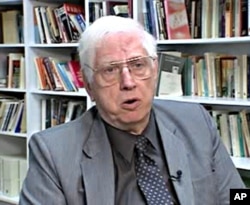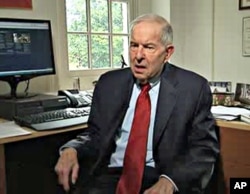India has decided to send a delegation to Indian Kashmir to gather information about the unrest that has left scores of people dead over the last three months. The decision came at a meeting Wednesday of political leaders in New Delhi.
Clashes between stone throwing protesters and security forces continued in Kashmir on Wednesday even as leaders from all political parties met in New Delhi to discuss the reasons for, and the ways to resolve, the three month old crisis.
Protests are not new to Kashmir. But these young Kashmiris do not fit the description of the usual suspects behind the violence that has plagued the divided region since 1989 when the Muslim separatist movement took a serious turn.
"The disturbances this time are being led by young, very much alienated people who are protesting against their quality of life," says Howard Schaffer of Georgetown University. "They are well educated in many cases and have difficulty in finding jobs and they feel oppressed by the large presence of military and police."
"I was shocked and distressed to see young men and women, even children, joining the protests on the streets," said Indian Prime Minister Manmohan Singh.
Walter Andersen at Johns Hopkins University notes that this time India cannot blame neighboring Pakistan for inciting trouble.
"This young generation is really homegrown," Andersen said. "In the past there was some validity to the Indian argument that much of it was due to cross-border activities, there may be still certain element of that. But this one seems to be more homegrown."
Prime Minister Singh did recognize the growing frustration among the youth in Kashmir when he promised a huge development package for the region before last year's general elections. But Schaffer says it didn't bring expected results.
"Over the years, though India has pumped large sums into economic development in Kashmir, the benefits of this economic development have not trickled down," Schaffer adds.
Mirwaiz Omar Farooq heads the umbrella separatist group known as Hurriyat.
"We don't want economic packages," says Omar Farooq . "We don't want jobs. We don't want incentives. We don't want autonomy. We want freedom."
And the standoff leads to slow economic progress and a lack of jobs, says Ajit Bawa, the president of Industrial Association of Kashmir.
"We are facing problems in terms of sales and we are facing a huge dent in production as well," said Bawa.
The younger generation also resents the special powers that Indian troops in Kashmir have in picking up and detaining separatists.
Differences over the issue were apparent at the All Party meeting in New Delhi. The opposition Bharatiya Janata Party is against withdrawing the special powers, but the Hurriyat umbrella party has made the withdrawal a precondition for any talks with the government.
The leader of Kashmir's People's Democratic Party, Mehbooba Mufti, says the ongoing crisis in Kashmir must be viewed from a humanitarian angle that has no place for pre-conditions.
"The prime minister has to offer an unconditional dialogue.The other side may be the Hurriyat, the separatist, they should also not put forward any condition and there has to be a dialogue," says Mufti.
But before that, Mufti says, the government must release all jailed demonstrators and end what she considers the siege of the Kashmiri people.





